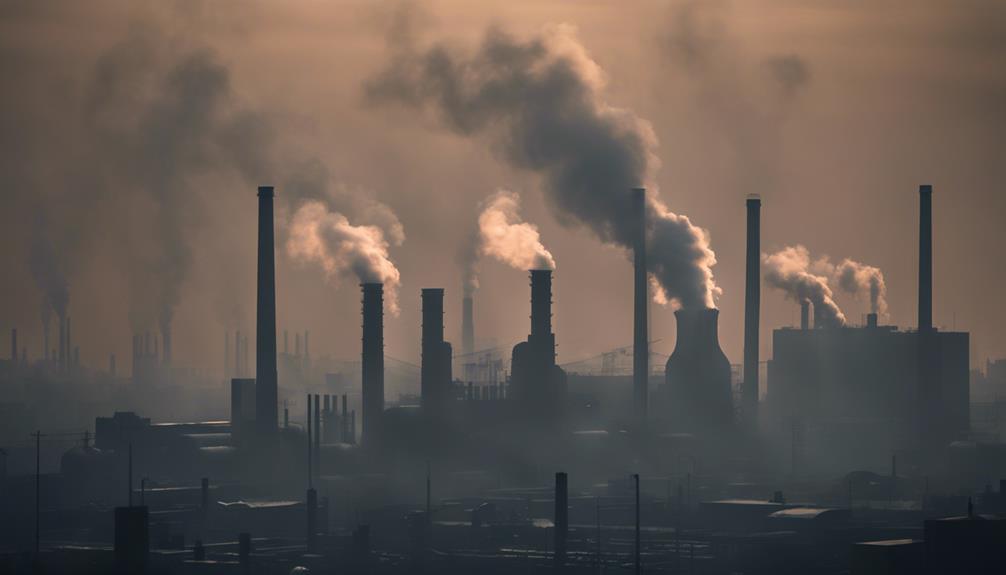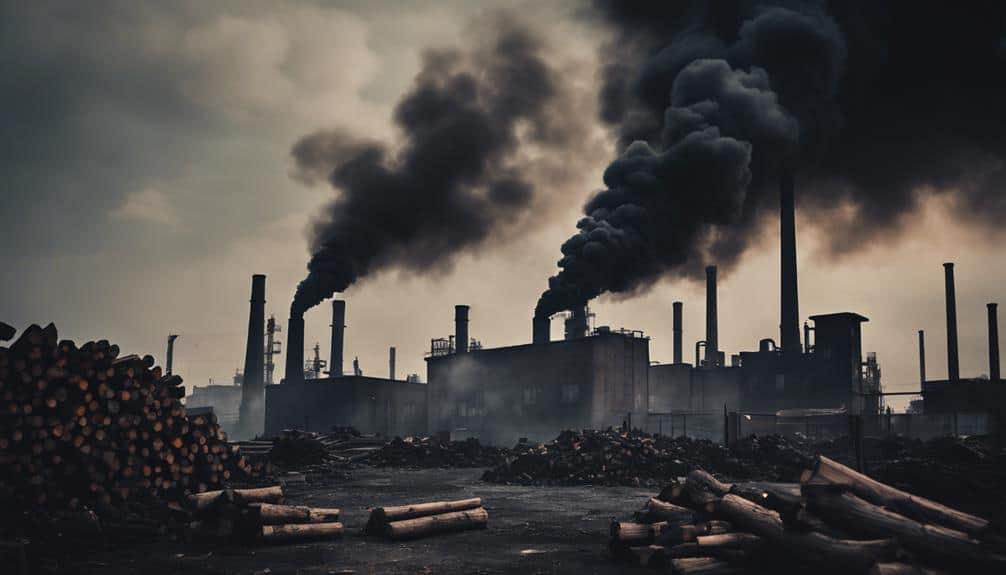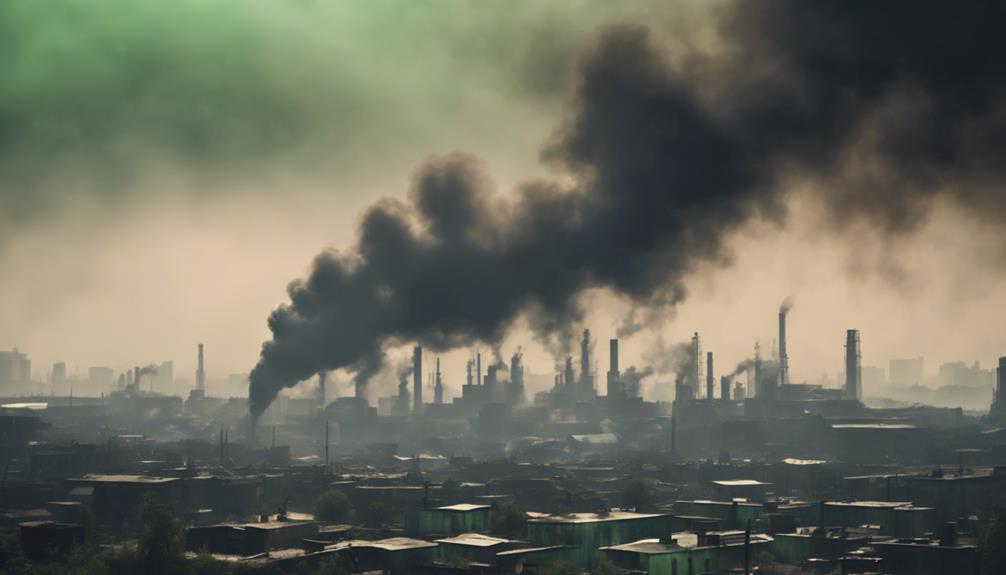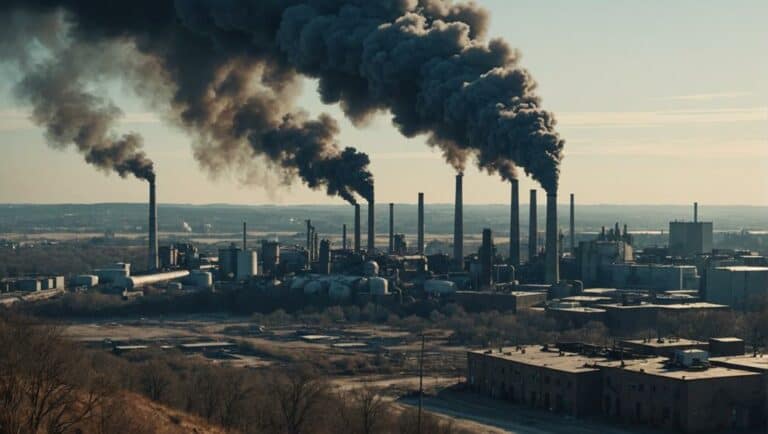Industrial progress has taken a heavy toll on our environment, as starkly illustrated by the Great Smog of 1952 that claimed nearly 4,000 lives.
With cities like Delhi and London grappling with severe pollution and wildfire smoke threatening over 2 billion people globally, the urgency for clean energy and international cooperation has never been greater.
The Great Smog of 1952
During December 1952, London experienced the catastrophic Great Smog, a deadly event that claimed nearly 4,000 lives. You might wonder how air pollution could become so lethal. The answer lies in a perfect storm of cold weather, increased coal burning, and an anticyclone weather pattern that trapped smoke and pollutants over the city. This deadly combination transformed London into a choking, foggy nightmare.
The Great Smog of 1952 wasn't just any fog; it was a toxic blend of smoke particles, carbon dioxide, hydrochloric acid, and sulphur dioxide. The thick fog rolled through the streets, reducing visibility to mere feet and causing severe respiratory problems for anyone exposed. Public health was in dire straits, and the urgency for change became undeniable.
In response to this tragedy, the British government introduced the Clean Air Acts of 1956 and 1968. These landmark laws banned the emission of black smoke and mandated the use of smokeless fuels, aiming to prevent any recurrence of such a disaster.
The Great Smog of 1952 serves as a grim reminder of the devastating consequences of unchecked air pollution and the critical need for robust environmental regulations.
Air Pollution and Climate Change

You can't ignore the dual impact of fossil fuels—they're driving climate change and causing deadly air pollution.
Shifting to cleaner energy sources isn't just about the future; it offers immediate health benefits, saving lives now.
From coal-fired power plants to wood burning, addressing these pollutants is essential for a healthier, more equitable world.
Fossil Fuels' Dual Impact
Burning fossil fuels releases a cocktail of pollutants that not only choke our air but also accelerate climate change, creating a dual crisis that demands urgent action. These pollutants include carbon dioxide (CO2), nitrogen oxides (NOx), and particulate matter, which contribute significantly to both air pollution and climate change. The interconnectedness of these issues means that tackling one can help mitigate the other.
Consider the devastating impact of fossil fuels:
- Air pollution: Responsible for 7 million deaths annually worldwide.
- Climate change: Drives severe weather events, rising sea levels, and global warming.
- Health risks: Increased respiratory and cardiovascular diseases.
- Environmental degradation: Damage to ecosystems and biodiversity.
- Economic costs: Billions spent on healthcare and disaster recovery.
Author Beth Gardiner, in her book 'Choked: Life and Breath in the Age of Air Pollution,' underscores this dual impact.
Shifting to cleaner energy sources, like Kraków's move away from coal, is essential. While wood is considered carbon-neutral, it still emits harmful pollutants, complicating the battle against air pollution and climate change.
It's clear that reducing our reliance on fossil fuels and accelerating cleaner energy shifts aren't just about saving the environment—it's about saving lives and ensuring a sustainable future.
Health Benefits Transition
Addressing the dual crisis of air pollution and climate change not only mitigates environmental damage but also releases significant health benefits. Shifting away from fossil fuels, the primary culprits behind these issues, can save countless lives. The World Health Organization estimates that air pollution causes 7 million deaths annually, highlighting the urgent need for change.
By reducing our reliance on fossil fuels, you can directly contribute to cleaner air, which has health benefits comparable to cutting down on sugar or increasing physical activity.
Burning fossil fuels not only pollutes the air but also drives climate change, showing just how interconnected these crises are. Understanding this connection allows you to see the hidden dangers of pollution and the urgent need for a shift.
Moving to sustainable energy sources is essential for a healthier future. Cleaner air reduces respiratory issues, cardiovascular diseases, and other health problems exacerbated by pollution.
Immediate Vs. Long-Term
The immediate health impacts of air pollution, causing millions of deaths each year, starkly contrast with the long-term environmental threats posed by climate change. When you think about air pollution, it's essential to recognize how burning fossil fuels not only tarnishes the air you breathe but also speeds up climate change.
The urgency to address both issues is clear, given their interconnected nature.
Burning fossil fuels releases pollutants that:
- Cause respiratory illnesses and cardiovascular diseases
- Contribute to 7 million deaths annually worldwide
- Lead to global warming by increasing greenhouse gas emissions
- Disrupt ecosystems and biodiversity
- Worsen extreme weather events
You can't ignore that shifting away from fossil fuels offers immediate health benefits, much like reducing sugar intake or promoting physical activity. Cleaner air translates to fewer hospital visits, lower healthcare costs, and a healthier population.
Furthermore, combating climate change by reducing reliance on fossil fuels ensures a sustainable and resilient planet for future generations.
Understanding the relationship between air pollution and climate change is vital for envisioning a healthier future. By making sustainable choices, you can greatly impact both your health and the environment. It's time to act decisively and prioritize both immediate and long-term well-being.
Coal and Wood Burning

Amid our quest for progress, coal and wood burning stand out as major culprits in the battle against severe air pollution, impacting both the environment and public health. Coal-fired power plants and home coal burning release vast amounts of harmful air pollution particles, contributing to smog and respiratory problems.
While burning wood is often marketed as a more natural or carbon-neutral alternative, it still emits dangerous pollutants that can damage health and degrade air quality.
In cities like Kraków, Poland, the home burning of coal has been banned to improve air quality and protect public health. This move highlights the urgent need to address these sources of pollution.
Although wood is frequently touted as a carbon-neutral fuel, the conditions needed for it to be genuinely sustainable are rarely met. Inefficient burning techniques and improper seasoning of wood can lead to higher emissions of particulate matter and other pollutants.
You need to understand the gravity of these sources of pollution. By reducing reliance on coal and adopting cleaner, more sustainable methods for heating and energy, we can mitigate the environmental and health impacts, paving the way for a cleaner, healthier future.
Global Pollution Hotspots

In examining global pollution hotspots, you'll find diverse challenges in cities like Delhi, London, Poland, and California, underscoring the urgent need for targeted action. Each of these regions paints a clear picture of the multifaceted problem that's air pollution. People living in these areas face the severe effects of air pollution daily, with health risks magnified by socio-economic factors.
Consider the following:
- Delhi: Struggles with high particulate matter due to vehicular emissions and industrial activities.
- London: Faces challenges from historic coal use and modern traffic congestion.
- Poland: Battles pollution from coal-dependent energy and outdated heating systems.
- California: Deals with smog from wildfires and vehicular traffic despite progressive environmental laws.
- Clean Air Act: Shows promise in improving air quality but reveals disparities in its enforcement and impact.
Efforts like the Clean Air Act in the US and China's initiatives to cut down pollution highlight potential solutions. However, achieving cleaner air requires consistent and inclusive policies. Addressing these hotspots involves understanding the unique causes and implementing robust, community-focused interventions to mitigate the effects of air pollution on people's lives.
Health Benefits of Cleaner Air

Imagine the profound impact on public health if we could breathe purer air every day. Cleaner air isn't just a necessity; it's an essential element that can transform lives. By reducing air pollution, especially from fossil fuels, we can achieve health benefits similar to those from cutting sugar or enhancing physical activity. Cleaner air can save lives and alleviate serious health conditions like strokes, heart attacks, cancer, dementia, and even premature birth.
Air pollution is a hidden danger, often overshadowed by other environmental issues, but its immediate impact on health is undeniable. By understanding these dangers, we can advocate for necessary changes. Shifting away from fossil fuels may be challenging, but it's vital for a healthier future. The interconnectedness of air pollution and health underscores the significance of our choices in shaping a cleaner environment.
As we push for cleaner air, we're not just fighting for the environment; we're fighting for our collective well-being. Cleaner air translates to fewer hospital visits, lower healthcare costs, and, most importantly, longer, healthier lives.
The health benefits of cleaner air are clear, and the urgency to act has never been more pressing.
Wildfire Smoke Pollution

You can't ignore the alarming rise in wildfire smoke pollution, which has reversed years of air quality progress, especially in states like California, Oregon, and Washington.
Over 2 billion people globally face the health risks associated with this pollution each year.
To protect our future, we urgently need effective strategies to predict, control, and mitigate these devastating impacts.
Global Health Impact
Every year, over 2 billion people are exposed to wildfire smoke pollution, underscoring its alarming impact on global health. The spread of smoke from wildfires is a stark reminder of how air pollution knows no borders. Wildfire smoke pollution severely degrades air quality, leading to a cascade of health issues that can no longer be overlooked.
Wildfire smoke contains a toxic mix of pollutants, including particulate matter (PM2.5), carbon monoxide, and volatile organic compounds. These pollutants penetrate deep into your lungs and bloodstream, causing serious health consequences. The global health impact is immense, as evidenced by recent wildfires in Canada that sent smoke all the way to the US East Coast.
Consider the following health risks posed by wildfire smoke pollution:
- Respiratory issues such as asthma and bronchitis
- Cardiovascular problems, including heart attacks and strokes
- Increased hospital admissions and emergency room visits
- Reduced lung function in children and the elderly
- Heightened risk of premature death
The pervasive nature of wildfire smoke pollution demands urgent action. It's not just an environmental issue; it's a public health crisis affecting millions worldwide. To mitigate its impact, holistic strategies are essential.
Air Quality Reversal
Due to the relentless spread of wildfire smoke, many states are witnessing a troubling reversal in air quality progress, undermining years of environmental efforts. States like Washington, Oregon, and California have seen air pollution levels spike dramatically. You might've noticed that, despite efforts to reduce emissions, the air quality seems worse than ever. That's because wildfire smoke doesn't just affect local areas; it travels vast distances, exacerbating the environmental cost of our progress.
In 2023, the impact was unprecedented, with smoke from Canadian wildfires reaching the East Coast of the US. This phenomenon isn't isolated; over 2 billion people globally are now exposed to air pollution from wildfires. The reversal in air quality progress is a significant setback, highlighting that our environmental strategies need to adapt to this new reality.
Wildfire smoke pollution is a complex problem that demands urgent attention and action. It's not just about the immediate health risks; long-term exposure can have devastating effects on public health and the environment.
Addressing this challenge is critical, and it requires thorough international cooperation and innovative solutions. Without decisive action, the environmental cost will only continue to rise.
Future Mitigation Strategies
Addressing the escalating issue of wildfire smoke pollution requires innovative mitigation strategies that prioritize both immediate and long-term solutions. Given the global impact, with over 2 billion people exposed annually, action is essential.
You might wonder, what can be done to mitigate the adverse effects of wildfire smoke and improve air quality? Here are some strategies worth considering:
- Enhanced Forecasting Systems: Develop advanced models to predict wildfire behavior and smoke dispersion, allowing communities to prepare and respond effectively.
- Forest Management Practices: Implement controlled burns and mechanical thinning to reduce fuel loads and prevent massive wildfires.
- Air Quality Monitoring: Expand networks of air quality sensors to provide real-time data and health advisories.
- Public Health Policies: Establish guidelines for vulnerable populations during smoke events and create clean air shelters.
- International Cooperation: Collaborate across borders to share resources, knowledge, and strategies for combating wildfire smoke pollution.
The difficulty in predicting and controlling wildfire spread underscores the need for holistic strategies. Projections of worsening air quality due to increasing wildfires make it clear that immediate, sustainable solutions are critical.
Solutions and Hope

In the face of escalating air pollution, Beth Gardiner's 'Choked' provides a compelling roadmap for achieving cleaner air through science-based solutions and community action. Gardiner emphasizes that clean air isn't just an environmental goal but a human right. Her book offers practical solutions and hope, spotlighting the critical role of a global response in addressing this pressing issue.
'Choked' insists on the importance of collaboration between scientists, policymakers, and ordinary citizens. It advocates for stricter regulations on emissions and encourages communities to push for policies that prioritize health over industrial convenience. Gardiner's insights reveal that, with determined effort and the right strategies, significant improvements in air quality are entirely achievable.
The book also highlights successful case studies from around the world, demonstrating that change is possible. For instance, cities that have implemented stringent air quality measures see marked improvements in public health. By fostering a sense of urgency and empowerment, Gardiner calls on everyone to be part of the solution.
Ultimately, 'Choked' is a call to action, urging you to advocate for cleaner air and embrace the hope that, with collective effort, a healthier future is within reach.


